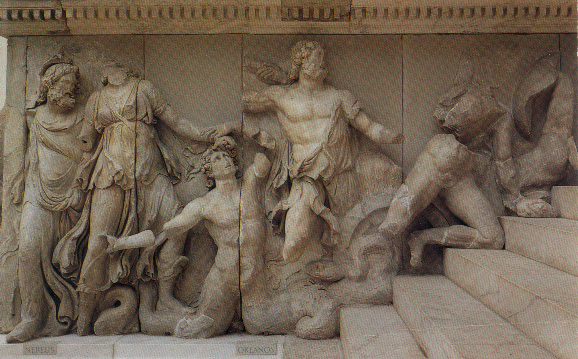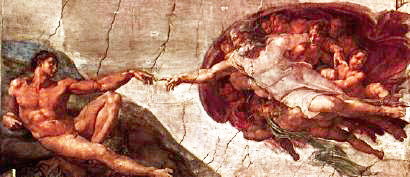Clifford
Geertz,
The
Interpretations of Culture
“Ideology
as a cultural system”

This
Ionian Greek altar decor at once reveals the struggle between the Titans and
the Gods, but also suggests that the Greeks at Pergamon, where the altar resided,
were conveying a message of why new belief systems were needed as this triumph
–of sky deities over thonic or earth deities, like Gaia– depicts.
The importance of such a struggle was symbolic and appealed to the emotions
of the faithful.
Basic
concepts in understanding ideology
Ideology
[originally meant] a collection of idealistic political proposals
ideology
[ idea + logos = Greek, eidos {image, ideal} & logos {logic, rationale} ]
ideology
implies:
Ideology
is best thought of as an expression of political faith in the power of ideas
to alter social arrangements, institutional power, organizational frameworks
and governing elites.

American
examples tied to European thought:
The underlying
beliefs are in contrast to the way the world actually behaves.
egalitarian versus elitist
egalitarian (bottom - up faith)
All people are to be trusted with the capacity to make
decisions that affect their lives.
elitist (top - down faith)
The
mass of people are to be feared because they are prone to emotion, uncontrolled
temperament that leads often to violence and dissolution of public order.
Geertz'
argues that:
1.
Ideology
has become a form of "radical intellectual depravity."
2.
Ideology
is a particular conception born of the 18th century Enlightenment
3.
Ideology
involves meaning, the expression of ideas to
convey that meaning and a cultural context in which that meaning
is understood.
4.
nature and ideology
Conclusive statements:

Ideology
as a product of the prevailing spirit and customary references of the times
and can thus be used as a political
rallying point.
Ideologies
then take the place of traditional religious, monarchical, and military authority
because the power those institutions once exerted over political discourse,
social organization and individual behavior has deteriorated.
Summary remarks:
Ideologies
are figurative, symbolic and
imaginative appeals to our emotional desires to believe
in larger than life possibilities and are at once an expression of hope and
a reflection of our despair.
Technology, because it is political, generates an ideologically persuasive slough of symbols,
metaphors and even creates unseen, yet very revered rules of conduct.
Science




